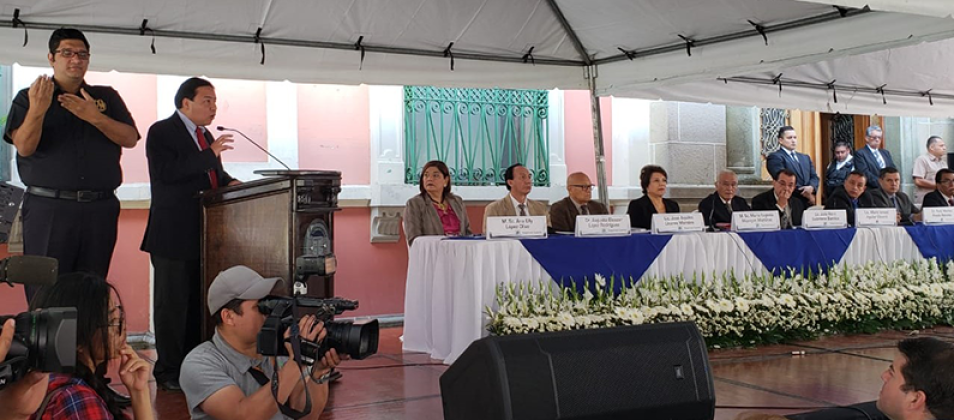
Guatemalan Political Parties Commit to a Transparent, Ethical and Peaceful Electoral Process
by Alessandra Rossi and Marit Björnlund*
The “Agreement for a Transparent, Ethical and Peaceful Electoral Process” was signed on March 11 by representatives of 18 of the 28 political parties that will participate in Guatemala’s general elections and elections to the Central American Parliament on June 16. Two additional parties have signed since the ceremony, for a total of 20. The signing of the pact remains open to other political parties that are interested in adding their names.
The agreement was an outcome of the Electoral Violence Prevention Plan developed by Guatemala’s Supreme Electoral Tribunal (TSE), with the support of the International Foundation for Electoral Systems (IFES) working within the framework of its "Electoral Governance and Reforms" project funded by the United States Agency for International Development (USAID).
The political parties that signed the agreement are committed to develop advocacy and electoral activities within the framework of “peace, tolerance, inclusion, respect, ethics, the observance of human rights, and in accordance with what is established in the Political Constitution of the Republic and the [Electoral and Political Parties Law (LEPP) of 2016].” The signatories also agree to avoid aggressions between candidates, militants and sympathizers, smear campaigns and disinformation and unfounded accusations or judicial litigation.
The agreement highlights issues of gender-based violence prevention and has inclusive language that takes into consideration human rights for ethnic minorities, people with disabilities and lesbian, gay, bisexual, transgender and intersex people, among others.
In August 2018, the TSE set up an Electoral Security Committee (CSE) to oversee the implementation of an Electoral Violence Prevention Plan and identify and prioritize activities to prevent and mitigate electoral conflict during the 2019 electoral process. In February 2019, the CSE established a subcommittee to focus specifically on developing a pact among political parties and coordinating its launch.
In its role as technical secretariat of the CSE, IFES prepared the draft of the “Agreement for a Transparent, Ethical and Peaceful Electoral Process,” including aspects related to the significant reforms of the 2016 LEPP. The document was discussed in six different work meetings. During this process of writing the agreement, Guatemala’s political parties and civil society organizations had the opportunity to offer their opinions and comments.
One week after the pact was signed marked the start of the campaign season in Guatemala. The pact contributes to an atmosphere of peace and democratic culture as campaigning gets underway.
The final version of the agreement contains 15 articles in which the TSE, jointly with the general secretaries of the political parties, witnesses of honor and representatives of the national civil society, including electoral observation groups, commit themselves to a continuous and voluntary effort to contribute to the democratic consolidation of the Guatemalan political system, through the democratic development of a 2019 electoral process in an atmosphere of peace and democratic culture.
Since April, the TSE, in collaboration with IFES, has also been working to promote the signing of municipal agreements for transparent, ethical and peaceful local electoral processes in municipalities considered to have a very high electoral risk. The municipalities were prioritized after extensive research and deliberation using maps prepared by IFES to identify the municipalities with the highest risk of electoral conflict.
IFES was honored to be invited to sign the “Agreement for a Transparent, Ethical and Peaceful Electoral Process” as a witness along with the United States Embassy in Guatemala, the Organization of American States and representatives of the G13 Group of Donors and United Nations.
IFES’ work in Guatemala is supported by USAID, as part of the Consortium for Elections and Political Process Strengthening’s (CEPPS) “Electoral Governance and Reforms” project. Established in 1995, CEPPS pools the expertise of three premier international organizations dedicated to democratic development: IFES, the International Republican Institute and the National Democratic Institute. CEPPS has a 20-year track record of collaboration and leadership in democracy, human rights and governance support, learning from experience, and adopting new approaches and tools based on the ever-evolving technological landscape.
*Alessandra Rossi is a resident director for Guatemala at IFES and Marit Björnlund is a program coordinator for the Americas at IFES.












